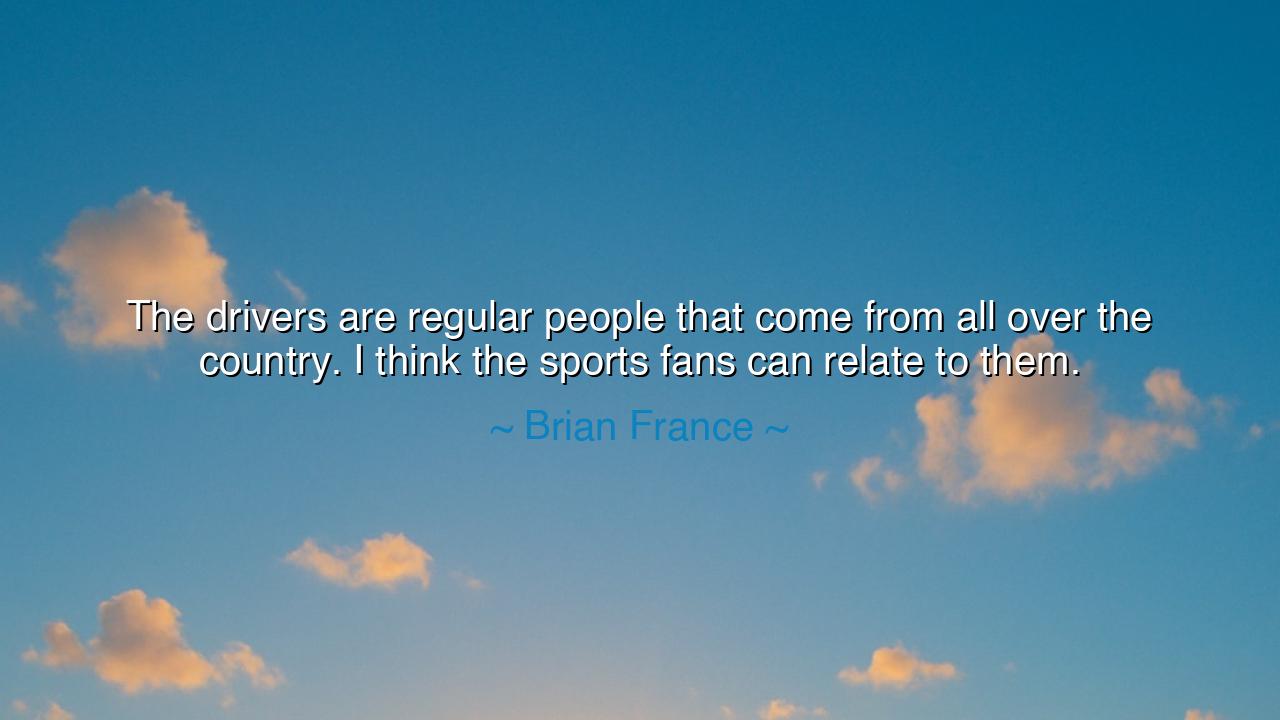
The drivers are regular people that come from all over the
The drivers are regular people that come from all over the country. I think the sports fans can relate to them.






Brian France once declared: “The drivers are regular people that come from all over the country. I think the sports fans can relate to them.” These words shine with a truth that transcends racing, sports, and even time itself. For within them lies the eternal bond between the hero and the people — that greatness is not always born from kings or gods, but from men and women who rise out of ordinary soil to do extraordinary things.
In these words, France speaks of the drivers, not as distant figures elevated beyond reach, but as regular people, born of the same streets, farms, and towns as those who cheer them on. This is the essence of relatability: the recognition that those who step into the arena, or sit behind the wheel, are reflections of ourselves, carrying the same hopes and fears, but daring to test them upon the stage of fire. This is why the people admire them, for their triumphs and struggles mirror their own.
History teaches us this lesson time and again. Consider the story of Abraham Lincoln, born in a log cabin, raised in poverty, yet rising to the presidency in America’s most perilous hour. His greatness was not diminished by his humble origins; it was strengthened by them. People loved him because they saw in him their own struggles, their own hunger, their own resilience. Like the drivers on the track, he was one of them, yet he carried their collective spirit to heights they could not imagine.
So it is in sports, where the most beloved champions are often those who come from humble beginnings. Jackie Robinson, who endured trials and prejudice, became not just a ballplayer but a symbol of courage. The people related to him not because he was flawless, but because he was human — and in his humanity, he displayed extraordinary strength. This is the power of France’s words: the recognition that sports fans do not merely crave spectacle, but connection.
And what is the meaning of this for us, seekers of wisdom? It is this: never believe that greatness is reserved for the elite or the distant. The regular person has within them the seeds of extraordinary deeds. The farmer’s son may become the champion of nations; the mechanic’s daughter may become the leader of a generation. The difference lies not in birth, but in courage, in endurance, and in the will to take one’s chance upon the track of life.
Practical actions follow naturally. Honor your roots, for they are not chains but foundations. See yourself not as lesser for being ordinary, but as prepared, as tested, as molded by the same struggles that bind all humanity together. When you strive, others will see themselves in you, and your victories will not be yours alone, but theirs as well. In this way, you become not only a competitor, but a symbol, a beacon to those who believe they too can rise.
Thus, Brian France’s words are not merely about racing, but about the eternal dance between heroes and those who cheer them. True heroes are not untouchable statues of perfection, but men and women who emerge from among the people, carry their spirit, and show what is possible. And so, children of tomorrow, let these words remind you: no matter how small your beginning, the finish line of greatness is open to you. Run, drive, fight, create — and in your striving, others will find themselves uplifted.






AAdministratorAdministrator
Welcome, honored guests. Please leave a comment, we will respond soon